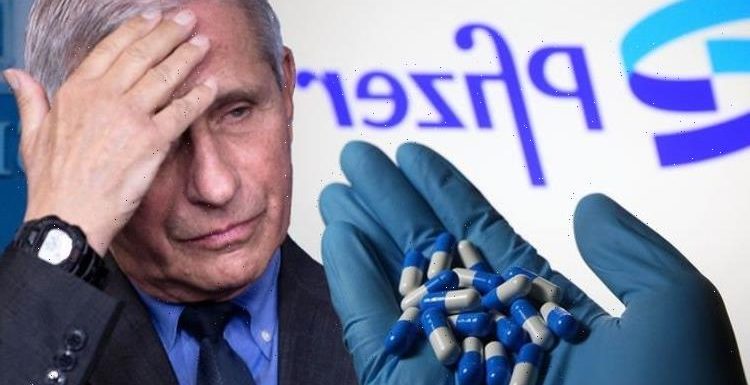
Anthony Fauci discusses using Covid antivirals
We use your sign-up to provide content in ways you’ve consented to and to improve our understanding of you. This may include adverts from us and 3rd parties based on our understanding. You can unsubscribe at any time. More info
Last week, Pfizer announced an additional agreement with the UK government to supply an additional 2.5 million treatment courses of its Paxlovid, which is an at-home pill that patients with Covid can take. Meanwhile, the US regulatory agencies also authorised Paxlovid, and Merck’s molnupiravir last week.
Both of these pills are expected to reduce the chances of hospitalization or death from COVID-19 in high-risk patients, although Pfizer’s pill appears to have much better results.
However, experts have warned against the side effects of these pills.
Merck’s molnupiravir is not authorized to be administered to children because it might interfere with their bone growth.
Pregnant women are also discouraged from taking this pill because of the potential for birth defects.


Meanwhile, Paxlovid, Pfizer’s pill is not advised for patients with severe kidney or liver problems.
Experts have also cautioned that the new drug could be life-threatening when taken with other medications.
Pfizer’s treatment consists of a combination of two pills- the antiviral nirmatrelvir and one tablet of ritonavir, which is taken over five days.
Pfizer stated that the Paxlovid tablets showed near 90 percent efficacy in preventing hospitalisations and deaths in high-risk patients.

Both Pfizer’s and Merck’s antiviral pills are not approved for people already hospitalised with COVID-19.
These pills are meant to be taken as soon as possible once a person begins to feel Covid symptoms appear.
The US Food and Drug Administration issued a fact sheet with a list of medications that should not be taken along with the Paxlovid pills.
It found that Ritonavir, which is one of the drugs that are part of the Paxlovid cocktail, will suppress a liver enzyme called CYP3A.
DON’T MISS:
Scientists stunned at ‘perfect’ Ice Age discovery: ‘Could have died… [REVEAL]
Archaeologist stunned at discovery of Jesus’ ‘childhood home’ [REVEAL]
Brexit Britain plots Putin fightback with plan to slash energy bills [INSIGHT]

This enzyme is specifically suppressed as it tends to break down many medications, including nirmatrelvir.
Doing so will help retain the antiviral properties of nirmatrelvir in the body at therapeutic levels for longer durations.
However, suppressing the liver result in other medications being boosted to the point where they become toxic.
The FDA said: “Therefore, caution should be exercised when administering Paxlovid to patients with pre-existing liver diseases, liver enzyme abnormalities, or hepatitis.”

They also noted that people who have been administered both of the “wonder-pills” will require careful monitoring by doctors and pharmacists.
Speaking to the Hill, a Pfizer spokesperson said: “Its effect on drug metabolism may result in drug interactions, and some drugs may be contraindicated.
“However, in light of the fact that Paxlovid has a short duration of treatment of five days, combined with a low dose of Ritonavir of 100 milligrams, we believe that healthcare professionals should find most DDIs to be generally manageable.
“Healthcare providers should consider the potential for drug interactions prior to and during Paxlovid therapy and review concomitant medications during Paxlovid therapy.”
Source: Read Full Article